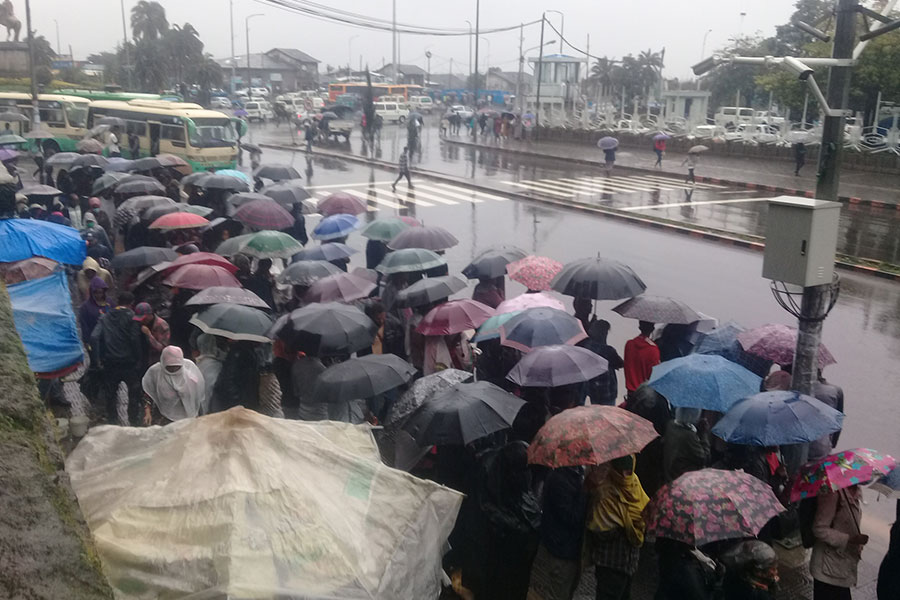
Sunday with Eden | Jul 27,2024
"Please stop!" screams the 63-year-old Nunu Bedane, as a spirited group from the Addis Abeba Code Enforcement Authority tears down an advertisement board that has been there for the past 12 years.
Fitted in green uniforms, about 40 baton-armed ensemble reply in a frenzied tone that it does not comply with the new reform. After half an hour of pleadings and tears, the group disperses, promising Nunu that they will return the next day. This time, they warned that there will not be mercy if she fails to obtain permission.
Nunu's story echoes through the streets of the business district around the Hayayhulet area on Haile Gebreselassie St., where baffled shopowners witness their decades-old establishments stripped of their marketing adornments. She feels defeated as two of her other shops around CMC and Salite Mihret area were not spared.
"All we want is to make a living in peace," Nunu told Fortune.
A theatrical spectacle has been unfolding across Addis Abeba for the past couple of weeks. Business owners plead with the city's patrol men over implementing new standards on outdoor advertisements, which was approved a year ago.
Bags of advertisements are piled up in the districts as shop owners try their hand at keeping the ads from being expropriated by the patrolmen.
One of these paramilitaries is Getahun Feleke from Wereda 04 of Bole District Code Enforcement Authority. He insists that they are cleaning up the capital whether business owners understand or not. According to Getahun, prior notices had been given to shopowners through a door-to-door campaign.
"Not knowing doesn't translate to freedom from accountability either," he said.
The advertisements deemed to alter the city's aesthetics are piled onto trucks and transported to backyards where scrap metals are stored to be disposed. A committee within the ranks of the Authority is tasked with the duty.
"We work in tandem with other bureaus as well," Getahun said.
In line with a citywide campaign to upgrade Addis Abeba's aesthetics and control illegal advertisements, the former head of the Building Permits & Control Authority, Sitotaw Akale, approved the standards. It serves as the ground to the sweeping campain that stipulates zonal aesthetics must be maintained while outdoor adornments must be complementary to city landmarks and infrastructure developments. Permits must be obtained from the Authority after approval of advertisement designs.
Officials disclose that years of awareness creation preceded the implementation.
Gebrehana Belete, a senior outdoor advertising expert at the Authority, suggests that the advertisement landscape in the capital lacks uniformity and should be complementary to the reforms undergoing in the city.
"The goal is to create a scenic city," he told Fortune.
Confiscated advertisements in woreda 4.
Eight types of advertisements, from digital billboards to large posters on vehicles all the way down to outdoor speakers, are regulated by the Authority. Gebrehana noted that the regulation of outdoor advertisements would increase public revenue as fees are required for the permit.
"Annual renewal fees add to the city's revenue stream," the senior expert indicated.
The Authority plans to collect 47 million Br in revenues from services fees in the year. It has managed to collect five million Birr from 4,624 permits in three months, fifth of the 20,000 permits planned for the year. However, the eight-person staff currently managing permits has been struggling to finish the process at a fast pace, according to Gebrehana.
"We just started out," he told Fortune. "Everything won't be smooth in the beginning."
The strict standards, which have led to the removal of thousands of advertisements in the past three months, include stipulations on height, appearance, colour and angles of billboards, with business owners fined up to 15,000 Br for failing to abide.
"There are no excuses for trespassing the law," said Gebreahana.
Business owners suggest otherwise.
Yordanos Gouse owns a chain of 29 organic beauty shops across the country. She claims to have had her electronic boards torn into pieces only two days after the enforcement stormed in and requested permits.
"We didn't know what they were talking about," Yordanos claimed.
The 40-year-old migrated from Ghana 12 years ago, looking to take advantage of the evolving Ethiopian business landscape."It is really difficult to do any business in the country," she told Fortune in a frustrated tone.
Yordanos indicates that outdoor advertising forms an integral part of her business model as part of a competitive sector that demands the constant introduction of new products.
Outdoor advertising has become an essential element of the marketing landscape, significantly evolving in sophistication since the early posters in ancient Egypt, which relied on concoctions of oil and water.
Political campaigns, new products and even public service announcements have adorned the urban landscape since paper posters started being produced in the 1860s. The current campaign in the capital has raised eyebrows from legal experts who note the possible violation of several stipulations within the commercial law.
Yehualashet Tamiru, a corporate lawyer, suggests that the vandalism and confiscation of property of a sole proprietor will be seen as a human rights violation under commercial law as the business and the owner are viewed as one.
He points to the unspecificity in the implementation of the law, which could give way to some authorities abusing the power given to them, pointing to the possibility of infringements during removals.
"Generalized laws are sources of misgivings and controversy", he told Fortune.
However, the expert also indicates that Ethiopian law assumes awareness when the implementation of a certain law begins.
"Lack of awareness does not prevent implementation," Yehualashet explained.
He did indicate that a provisional period is typically given when laws are implemented with significant implications, which could have been the source of the commotion over the past few weeks.
In the first quarter of the year, the Authority removed over 134,000 advertisements across the capital on billboards, posters, and signboards.
Semeneh Yilkal, the regulation and inspection head at the Authority, suggests that strict regulations originate from the high prevalence of illegal actors in the capital.
"Our mandate is to enforce existing laws," he told Fortune. "We are not out here harassing businesses".
He explains that awareness creation and punishment of transgressors will help them attain their objectives in the year.
The Urban Beautification & Green Development Bureau, which operates under a budget of 1.4 billion Br has also been removing advertisements that donot mesh with its standards, having stripped 10,000 ads from Addis Abeba's aesthetic structure in the past two months.
Under Almaz Kebede, the Beautification Development Monitoring Directorate has been targeting advertisements that defile green landscapes.
"We've been removing advertisements and informal settlement," she said.
Almaz suggests that the expansion of the urban population size in the capital leaves little room for open spaces, parks and resting spots, which are essential elements of an appealing urban landscape.
She revealed that investors who enter into agreements with the Bureau will be allowed to develop green and open spaces where they can advertise their products as long as they place it on boards less than a meter in height and 60cm in width.
"We do our best to keep the city beautiful," she told Fortune.
With the new law prohibiting alcohol advertisements on billboards and buildings which contain product names and prices, liquor store owners have been particularly on edge.
Esayas Lemma, an owner of a liquor store around the Atlas area, took down his signboards after members of the code enforcement authority told him he needed to obtain permits.
"I was shocked to learn I could not receive permits," he said in a disappointed tone.
Esayas, who sells 22 varieties of alcoholic products through two of his shops, claims to have been completely unaware that the city administration was cooking up such standards.
Akiya Teshome, the owner of a decade-old eponymous advertising firm, insists that the new standards have begun implementation without the necessary scrutinization and will have serious difficulties in implementation.
"No creative people were likely consulted in the drafting," he said.
While Akiya welcomes the implementation of a proper system to enable the acquisition of permits for outdoor advertisements, he indicates the need for further deliberation on certain elements around the implementation process.
His advertising firm, which began with 5,000 Br in paid-up capital, was hit hard when alcohol was banned on large billboards in public spaces three years ago.
"Early discussions would have saved us a lot in expenses," he said.
Business consultants like Yoseph Getachew insinuate that a host of policies and attitudes to private business over the past few years have been debilitating to entrepreneurial growth.
He points to Ethiopia's 178th ranking in minor investor protection indexes as indicative of an undue involvement of the government in the business landscape.
"Inconvient procedures are bound to restrict business growth," he said.
Yospeh argues that revenue collection objectives should not come at the expense of creating an enabling environment for businesses as they ultimately reduce collectable taxes. Yoseh recommends establishing a predictable business landscape that enables both businesses to thrive and the government to have access to higher taxable revenue.
"It is a slippery slope," he told Fortune.
PUBLISHED ON
Nov 25,2023 [ VOL
24 , NO
1230]

Sunday with Eden | Jul 27,2024

Fortune News | Mar 18,2023

Agenda | Feb 18,2023

Radar | Aug 13,2022

Radar | Oct 19,2024

Radar | Aug 13,2022

Fortune News | Jan 03,2025

Sunday with Eden | Aug 10,2024

Viewpoints | Oct 26,2024

Radar | Jul 28,2024

Dec 22 , 2024 . By TIZITA SHEWAFERAW
Charged with transforming colossal state-owned enterprises into modern and competitiv...

Aug 18 , 2024 . By AKSAH ITALO
Although predictable Yonas Zerihun's job in the ride-hailing service is not immune to...

Jul 28 , 2024 . By TIZITA SHEWAFERAW
Unhabitual, perhaps too many, Samuel Gebreyohannes, 38, used to occasionally enjoy a couple of beers at breakfast. However, he recently swit...

Jul 13 , 2024 . By AKSAH ITALO
Investors who rely on tractors, trucks, and field vehicles for commuting, transporting commodities, and f...

Oct 11 , 2025
Ladislas Farago, a roving Associated Press (AP) correspondent, arrived in Ethiopia in...

Oct 4 , 2025
Eyob Tekalegn (PhD) had been in the Governor's chair for only weeks when, on Septembe...

Sep 27 , 2025
Four years into an experiment with “shock therapy” in education, the national moo...

Sep 20 , 2025
Getachew Reda's return to the national stage was always going to stir attention. Once...